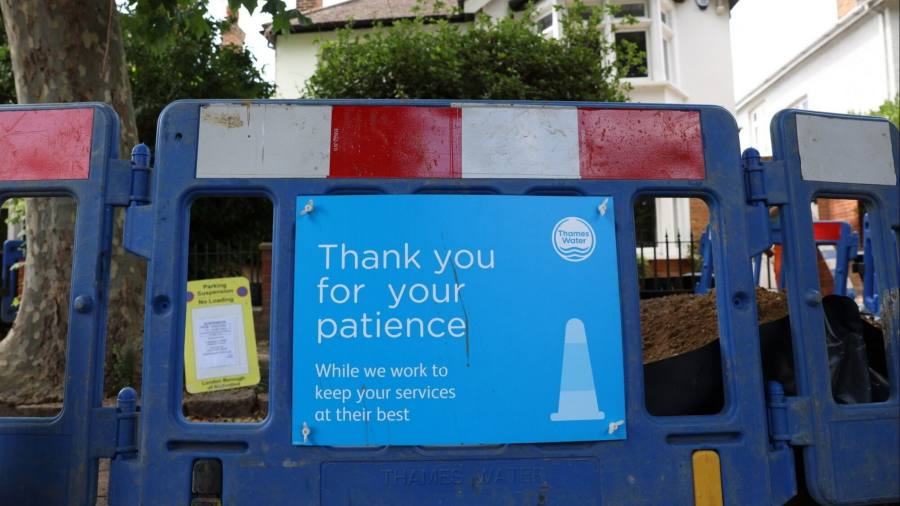
Receive free Thames Water PLC updates
We’ll send you a myFT Daily Digest email rounding up the latest Thames Water PLC news every morning.
Our world is awash with opinions on Thames Water. Here, from Citigroup analyst Jenny Ping, is another:
Ofwat has been criticised for not being tough enough as a regulator, especially with companies taking cash out of businesses rather than investing back into the business. If one or more water utility in the UK were to financially collapse, we believe this could actually help Ofwat to show they were tough enough on the sector, with those who don’t deliver on the license obligations fail to exist. This could put pressure on Ofwat to ensure this does not become an endemic sector wide issue and make it easier to propose a set of fair regulatory proposal for AMP8.
The AMP in AMP8 stands for asset management period. It’s Ofwat’s framework for allowed returns that’ll run for five years from April 2025. Citi argues that if Thames Water dies between now and then it’ll prove the current regime is fit for purpose, which “could actually be a positive for the sector”.
What exactly Citi means by “collapse” isn’t defined. As has been discussed at length here and elsewhere, Thames Water’s regulatory assets are ringfenced within the operating company so the buck stops for investors at holding-company level. The government’s choice, if push came to shove, would be between injecting equity at the topco level or just above the ringfence.
To remind, there’s £14.3bn of debt attached to Thames Water’s opco that’s secured on £17.9bn of regulated operating assets. Though shareholders would almost certainly be wiped out by any kind of government intervention, an equity injection just above the ringfence has the convenience of safeguarding the assets while only zeroing junior debtholders — as in, the Kemble entities that are wholly dependent on opco dividends.
Of all the bailout paths available, this is probably the least bad. It’s also what the market has been assuming, by a balance of probabilities, since Thames Water hit the front pages last week. But because nothing had to happen immediately, and because no one’s prepared to talk about the specifics of a contingency plan, certainties are few and reducing.
The cannon-fodder junior debt has rallied for three straight sessions to trade at around 60p in the pound while opco debt — the ringfenced stuff with creditor protection via the whole business securitisation — drifts wider. There’s also a hint of sector contagion. Nationalisation threats might have been intended to cajole Thames Water investors into putting in more equity but a talk of crisis can be self-fulfilling, particularly within a sector that suppurates with resentment.
Publicly, water companies talk of stakeholder engagement as the best way forward — see the leaked memo from Severn Trent CEO Liv Garfield about how utilities should rebrand as “social purpose companies” so they’re “attractive to the Labour leadership”. Privately, there’s a want to somehow sell the idea that underinvestment has been a benefit shared. Here via email is how a specialist-sales trader at JPMorgan sums up the scene:
There is something especially upsetting about those trusted to deliver clean water actually polluting our rivers and seas because of decades of under-investment in the system. Extracting billions in dividends and over-leveraging the sector adds an egregious economic angle to that environmental neglect. The sector was privatised debt free and now carries £60bn of debt — or nearly 70% of aggregate Regulatory Capital Value (RCV).
It’s all wrong! These monopoly utilities have over-leveraged social assets and made exceptional gains. The health of our environment and the sanctity of water security have been ignored. Many suggest the regulator has allowed this to happen over decades of cosy co-existence. Those people would argue OFWAT is unfit for purpose. The case for nationalisation to punish the ’evil financiers’ and regain control of critical natural monopolies becomes compelling…until we consider the practicalities of finding a solution.
Today we need investment. New reservoirs, replacement pipes sewers, improved efficiency and this is not a challenge which public ownership will readily solve. Jeremy Hunt does not want to incorporate the industry’s £60bn debt onto his balance sheet nor fund the vast burden of remedial capex ahead.
So whilst we want revenge, we actually need rapprochement. It takes a good deal of emotional dexterity but the answer is to offer higher returns for much-needed capital spend — and to fund it through the only means possible higher bills. None of us would choose to start from here. It doesn’t seem fair or right. But there is no alternative. Cheap bills were the other benefit of decades of underinvestment in UK water infrastructure…That era of cosmetic, short term good times is over. Water prices must rise to allow the necessary investment to flow into the sector. Those returns will accrue to private capital but that is capitalism… Natural monopolies require private sector capital in concert with powerful regulation to ensure the preservation of long-term system integrity not simply its immediate monetisation.
Water utilities need to publish their plans for the AMP8 business plans by October. The government and Ofwat had been indicating before the crisis that bills would be allowed rise, but have since appeared paralysed as profiteering and dead fish came to dominate the discourse.
In these circumstances it’s not completely unreasonable to think, as Citi’s Ping argues, that everyone’s bargaining position might be helped in the long run by a ritual sacrifice.
Further reading:
— FT.com/Thames Water